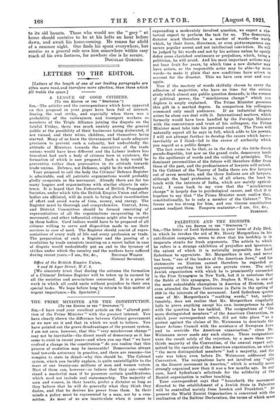THE PRIME MINISTER AND THE CONSTITUTION. [To THE EDITOR OP
THE " SPECTATOR."] have read your excellent article on the " altered posi- tion of the Prime Minister " with the greatest interest. You have clearly shown the difference between Cabinet government as we now see it and that in which we used to believe. You have pointed out the grave disadvantages of the present system. I am not sure, however, that this " very mischievous change " may not be inevitable—the direct result of democracy as it has come to exist in recent years—and when you say that " we have evolved a change in the constitution" do you realize that this process of evolution may be inexorable? Democracies always tend towards autocracy in practice, and there are reasons—too complex to state in detail—why this should be. The Cabinet system, which you lucidly explain, is quite unintelligible to the mass of our twenty-one millions of men and women voters. Most of them can, however—or believe that they can—under- stand a masterful man if he possesses certain qualifications, which need not include real statesmanship. The majority of men and women, in their hearts, prefer a dictator so long as they believe that he will do generally what they think they desire, and that he derives his power from them. In their minds a policy must be represented by a man, not by a com- mittee. As most of us are inarticulate when it comes to expounding a moderately involved question, we expect a rhe- torical expert to perform the task for us. The democratic dictator must therefore be a master of words—the words which, by their force, directness, or even picturesqueness can secure popular assent and not intellectual conviction. He will be judged by his words and not by his actions unless he openly defies some cherished sentiments or prejudices, which, being a politician, he will avoid. And his most important actions may not bear fruit for years, by which time a new dictator may have arisen, or the responsible actor may be able—by more words—to make it plain that new conditions have arisen to account for the disaster. This we have seen over and over again.
Now if the mastery of words skilfully chosen to carry the adhesion of majorities, who have no time for the serious study which almost any public question demands, is 4he essence of political power, the "mischievous change" which you deplore is amply explained. The Prime Minister possesses this gift in a marked degree. In comparison his colleagues command only small audiences. If an industrial dispute arises he alone can deal with it. International matters, which formerly would have been handled by the Foreign Minister with the concurrence and trust of his colleagues, the Prime Minister must take into his personal control. The Press will naturally report all he says in full, which adds to his powers. I will not attempt further to develop the causes which have— inevitably as I think—led to the excess of authority which you regard as a public danger.
The fact seems to be that, as in the days of the little Greek pseudo-Republic, but now on the grand scale, democracy tends to the apotheosis of words and the veiling of principles. The dominant personalities of the future will therefore differ from those of the past, and the predominance of lawyers will extend. In the Cabinet of the Viceroy of India there are five lawyers out of seven members, and the three Indians are all lawyers, although the legal profession is, of all others, the least in touch with the interests of India, which are mainly agricul- tural. I come back to my view that the "mischievous change" is largely due to psychological causes, and that it is hopeless to say that "the Prime Minister must realize that, constitutionally, he is only a member of the Cabinet." The forces are too strong for him, and our viscous constitution cannot readjust them. Tempora mutantur.—I am, Sir, &c., Ssrnssas s.


































 Previous page
Previous page